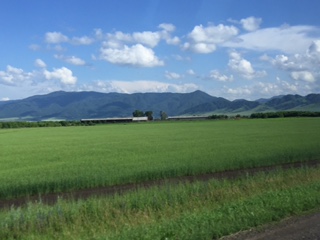Heather Goldberg, South Seneca Central School District
Majestic is the word that came to mind as the Golden Altai
mountain range first came into view on our approach to the area from Barnaul.
It was the first weekend excursion and we had been travelling for many hours.
This view was the payoff.
At first only ridges in shades of blue and green revealed
themselves, but soon we were close enough to see the “velvety” surface of these
mountains. Within minutes they surrounded us. Looking in any direction one
couldn’t help but to be awestruck by this new world of green rolling hills and
layers of velvety peaks, one in front of the other, in front of still others.
Our first stop was at an Altai dairy farm, “Farm Three A,” where we tasted fresh made cheeses, milk, honey, visited with the goats, and
relished in the beauty of this countryside.
We arrived at our destination for overnight accommodations “Forest
Fairytale,” aptly named, nestled in the Altai mountains, surrounded by forest.
After a good night’s sleep, shower and breakfast, we loaded into jeep-like
vehicles for what would be the off-road adventure of a lifetime! We stopped
briefly, early in the journey at a spot where a stream runs through the
boundary of the Altai Krai and Altai Republic. The stream marks the “return
home” for many traveling Altaians. Here there are totems and a multitude of
colorful ribbons tied to branches of the trees near the stream.
It is an Altai
tradition to stop as you travel by to take time to pay tribute to the elements
of the natural world. The focus at this sacred spot is to thank God, not to ask
for anything. This place of spiritual contemplation is usually found near water
and usually at higher elevations. According to Altai tradition, ribbons are
tied to birch, cedar, or fir trees. Visiting tourists often tie to any
available tree. White ribbons signify clear, clean thoughts and good-natured
desires and are a tribute to spirits or gods. This was a beautiful example of
the history of the deep connection between the people who inhabited and still inhabit
this region of the world, and their natural environment. Several of us washed
our faces or hands in the stream, and some drank from the stream before we
continued on our way.
Our driver hauled five of us up the mountain through two to
three feet of mud in some spots, up a stream-bed (with water flowing!), over,
between and around large rocks and boulders, and along a cliff’s edge. We
bounced around the vehicle holding onto any available handles, many times in
disbelief we’d be able to continue due to recent rain and very rugged terrain.
It was just another day on the mountain for our very skilled driver.
When we stopped to allow the other vehicles in our caravan
to catch up, we tried in vain to capture the views with our cameras.
We arrived at the trail’s head and began our trek up the
River Shinok Gorge. This was no small feat. The path was quite slippery with
mud. We had to cross streams several times, sometimes using a rope to steady
ourselves! In other spots we used rocks and tree roots as handles to climb the
steep incline.
There were ropes tied to trees in some areas to assist us.
Each of three waterfalls we encountered made every step worthwhile. Our amazing
guides Igor and Elena prepared a delicious picnic lunch for us mid-hike to
provide us with energy to complete this journey.
Elena was our “Mary Poppins” on this, and all excursions so
far, pulling out a seemingly endless supply of snacks, and drinks among other
things, from her bag. None of us can figure out how it all fits in that bag! We
enjoyed tea and snacks at the climax of the hike. Even in the wilderness, Igor
and Elena show us true Russian hospitality.
In addition to the beauty of the trail and views we took in
from it, I was amazed by the number of small children we encountered on the
hike. Russians are a hearty bunch! It was as if some of these families were out
for the day for a picnic and seemed to have approached this endeavor much more
casually than our group. Many folks we saw were hiking in water shoes and every
day type clothing, while we were outfitted in outdoor gear and shoes we hoped
would give us an edge in this natural environment.
That evening, back at the lodge at “Forest Fairytale,” we
ate, showered our exhausted bodies, then gathered in an ail for a campfire and
camaraderie.
This first encounter with the Golden Altai has given me a
glimpse into the landscape and history of a region that inspired settings for
Shukshin’s books, and paintings by artists like Sergei Prokhorov. The beauty and
diversity of landscapes we encountered were not at all what I expected from my
idea of “Siberia” before coming to Russia. Once these mountains greet your
heart and eyes they will always be with you.














